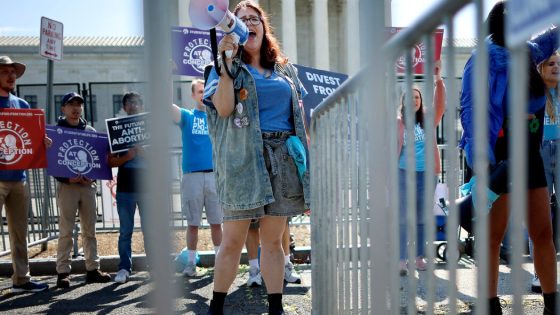An anti-abortion activist who led a blockade of a reproductive health clinic in Washington, D.C., in 2020 and drew widespread attention after the authorities found human fetuses at her home was sentenced on Tuesday to nearly five years in prison.
Judge Colleen Kollar-Kotelly of U.S. District Court in Washington sentenced the activist, Lauren Handy, 30, of Virginia, to 57 months in prison for her role in the blockade, officials said. Ms. Handy was one of several people convicted last year of civil rights conspiracy and of violating the Freedom of Access to Clinic Entrances Act in connection with the blockade. That law makes it a crime to threaten, obstruct or injure a person seeking access to a reproductive health clinic or to damage clinic property.
Matthew Graves, the U.S. attorney for the District of Columbia, said in a statement on Tuesday that Ms. Handy and her co-defendants had “conspired to use force to prevent fellow citizens from exercising rights protected by law.”
“People cannot resort to using force and intimidation to prevent others from engaging in lawful activity simply because they disagree with the law,” he said.
Martin Cannon of the nonprofit Thomas More Society law firm, which represented Ms. Handy, said in statement that she and her co-defendants had “conspired to be peaceful” and that the firm would “vigorously pursue an appeal of Ms. Handy’s conviction.”
Steve Crampton, also a lawyer for Ms. Handy, said in an interview on Tuesday that his client had been sentenced “for engaging in what Lauren vowed to make a nonviolent, peaceful demonstration against abortion.”
“Just seems entirely out of the realm of possibility in our nation,” he said.
Ms. Handy, who directed the invasion and blockade of the Washington Surgi-clinic on Oct. 22, 2020, arrived for an appointment she had made at the clinic under a false name, prosecutors said. That was when she and her co-defendants pushed their way into the waiting room and blocked its doors with their bodies, furniture, chains and ropes.
Prosecutors said the blockade had prevented two patients from entering the treatment area, including one who was “experiencing labor pains and in need of immediate medical attention.”
That patient had to lie on a hallway floor outside the clinic “because the co-defendants refused to allow her and her husband to enter,” prosecutors said. The other patient, they said, “was forced to climb onto a chair and through a receptionist window in the waiting room” to enter the treatment area.
The blockade, which was livestreamed on Facebook, also left a nurse with a sprained ankle, prosecutors said.
In a sentencing memo, prosecutors asked the judge to sentence Ms. Handy to 63 to 78 months in prison, noting that her “conduct showed a flagrant disregard for women’s reproductive health rights, and the lack of concern for patients.”
Ms. Handy’s lawyers had requested a 12-month sentence for their client, noting in their statement that it “effectively amounts to time served.”
Prosecutors said that “despite a history of arrests and local prosecutions for participating in clinic invasions throughout the country,” Ms. Handy had not been “deterred from violating federal laws” and that she “not only capitalized on her victimization of vulnerable victims, but she also promoted and publicized her crimes.”
Ms. Handy previously drew widespread attention in March 2022, the day after she was charged in connection with the clinic blockade, when the police said that they had found five fetuses in a home that an anti-abortion group said was hers.
The Metropolitan Police Department of the District of Columbia said at the time that it had acted on a tip about “potential biohazard material.”
Tom Lynch, a police spokesman, said on Tuesday that the investigation into the fetuses was continuing.
Several of Ms. Handy’s co-defendants were also sentenced on Tuesday, including John Hinshaw, 69, of New York, who was sentenced to 21 months in prison, and William Goodman, 54, also of New York, who was sentenced to 27 months. The only co-defendant who pleaded guilty, Jay Smith, 34, of New York, was sentenced in March 2023 to 10 months in prison.
Officials said four additional defendants would be sentenced on Wednesday and two more in the coming weeks.
Source Agencies


